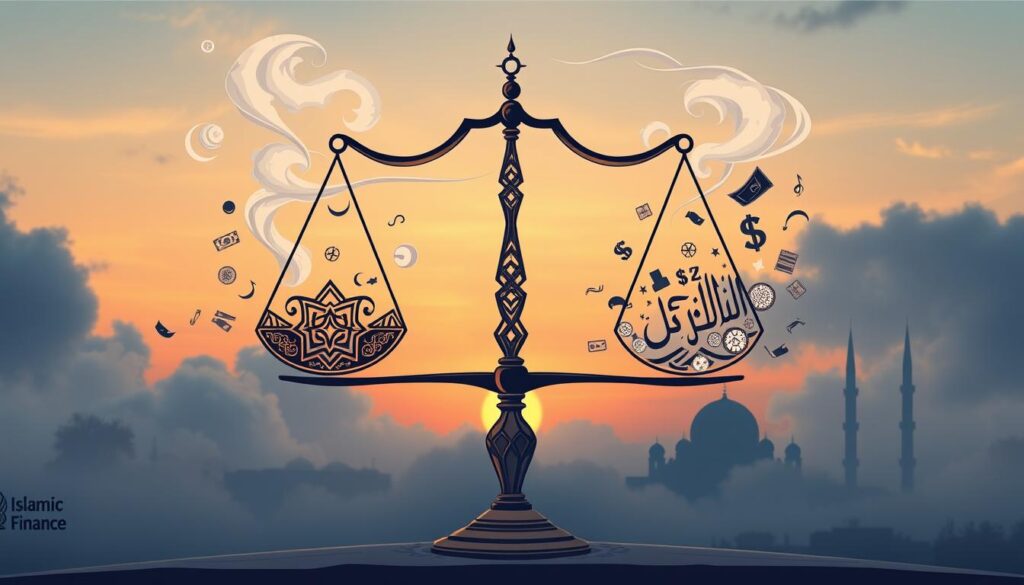In exploring the Ethics of Islamic Finance, we find more than just making money. It’s about moral duty. The Islamic Financial Services Board (IFSB) shows us that acting right is key. It also promotes fairness and helping each other in our communities.
Islamic finance combines duty and the outcomes of our actions. Working together lets us help others, sticking to Islamic ethics. This area grows with investments that care about society, like the Umar Khan Charity Organization. By doing so, we start a new chapter in finance that values honesty and caring for others.
Key Takeaways
- Ethics of Islamic Finance emphasizes moral responsibilities in financial practices.
- Sharia-compliant finance prohibits unethical behavior, fostering social justice.
- Islamic financial ethics promote a dual approach to normative ethics.
- Growing demand for ethical finance solutions highlights the need for integrity.
- Emerging green and social responsibility Sukūk expand the scope of ethical investments.
- Collaborative financing methods are vital for risk-sharing in Islamic finance.
- Engagement with community organizations enhances the impact of ethical finance.
Understanding Islamic Finance Principles
Islamic finance principles set the stage for a financial system that values ethics, community, and fairness. They’re based on Shariah law, which tells us what financial actions are okay and which are not. This helps us create a financial world that promotes lasting development.
Definition of Islamic Finance
Islamic finance follows Islamic law, aiming for high ethical standards. It focuses on sharing risks fairly and avoiding practices that could take advantage of others. Every financial deal must reflect Islamic morals. This ensures fairness and equity for everyone involved.
Key Concepts: Riba, Gharar, and Maysir
Islamic finance is built on important ethical ideas:
- Riba: This is the rule against interest, seen as unfair and harmful.
- Gharar: This stops too much uncertainty in contracts. It makes sure all parties know what they’re getting into.
- Maysir: This rule bans betting activities, like gambling, which harm society.
Core Principles of Shariah Law
Shariah law has core principles that guide Islamic finance. These principles are:
- Promoting social justice and equality.
- Ensuring ethical investing. Money should go to good causes, steering clear of businesses like those selling alcohol or pork, which are forbidden.
- Using profit-and-loss sharing models, like mudarabah and musharakah. This way, stakeholders work towards common goals.
By following Islamic finance principles, we aim to support communities in need. We do this while strictly adhering to Shariah law. This approach leads to sustainable, ethical financial solutions.
The Role of Ethics in Islamic Finance
In Islamic finance, ethics are at the heart of all practices and beliefs. We see importance of ethics as more than a business need—it’s a deep moral duty. Ethical actions help create a finance world built on trust, responsibility, and caring for society. By following Islamic financial ethics, banks manage better and improve a lot, which is good for everyone.
Importance of Ethical Behavior
Many studies show that being ethical is key to doing well in finance. A study with 411 workers in Islamic banks in Indonesia found that following Islamic ethics leads to better project work and happier customers. The ethical standards in Islamic banking touch on everything in life, like business and starting companies. In places like Indonesia, Malaysia, and Pakistan, Islamic finance is doing really well at being ethical. This approach helps the community a lot and tackles poverty by using things like zakah.
Distinction from Conventional Finance
Islamic finance is different from traditional finance because it cares more about being ethical than just making money. It focuses on fairness and helping everyone. Banks have seen that funds that care about society do really well, proving being ethical pays off. However, not following these ethics has caused losses and less trust from people. This shows why Islamic finance needs to keep a close eye on following the rules. People want to use financial services that are honest and responsible.

| Outcome | Traditional Finance | Islamic Finance |
|---|---|---|
| Focus on Profit | High | Moderate |
| Community Impact | Low | High |
| Risk Management | Profit-oriented | Shared risk |
| Consumer Trust | Varies | Increased with ethics |
| Regulatory Compliance | Variable | Essential |
By sticking to Islamic financial ethics, we work towards a financial world that grows but also helps everyone. This shows our promise to lead ethically and care for society.
Prohibition of Riba: Understanding Interest
Riba’s ban is key in Islamic finance. It stands for fair economic actions. Riba is seen as bad for individuals and society.
Knowing how interest affects us shows the deep ethical reasons for its ban.
The Impact of Riba on Society
Riba in interest systems causes inequality and risks economic health. It comes in two types: Riba al-Fadl and Riba al-Nasi’ah. The first is about unfair goods exchange, and the second deals with interest on late payments.
This ban is vital for reducing wealth gaps, allowing for fair economic growth. Interest leads to unfair gains, pushing some into poverty. It stops people from moving up in society by making them owe too much.
Following this ban helps society and matches Islamic values of fairness. The effect of interest on society is widely seen as bad.
Alternatives to Interest in Islamic Finance
Islamic finance offers fair alternatives to interest. Options like Murabaha and Ijara let people share profits, not just pay interest. This approach values shared economic growth.
Using these principles helps create a fairer economy. These alternatives help spread wealth evenly, supporting those in need.
Gharar and Its Implications for Financial Products
Gharar is a concept in Islamic finance that means risk or uncertainty in deals. It can cause unfair situations, making clear contract terms very important. By understanding Gharar, we see how Islamic finance promotes fairness and ethics.
Definition and Examples of Gharar
Gharar appears in contracts with unclear ownership. Some examples are:
- Options contracts
- Future sales
- Short selling
- Day trading
- Sales involving unknown goods
These kinds of deals can lead to guessing games, which Islamic finance tries to avoid. Research shows a large portion of financial contracts might have Gharar, which is why there’s a push for Shariah-compliant options.
How Gharar Affects Risk Management
Dealing with Gharar is key in Islamic finance for managing risks well. Contracts full of uncertainty can expose investors to losses. Islam encourages clear contracts to minimize risks. Following these guidelines slashes Gharar by half, safeguarding investors and helping the economy.

Maysir: Gambling and Financial Practices
Maysir, or gambling, is a practice that Islamic finance firmly prohibits due to its inherent risks and uncertainty. Recognizing Maysir in financial dealings helps promote an ethical framework. This includes spotting speculation that shifts focus from solid economic practices.
We aim to highlight these issues because they can cause instability and harm. This impacts both individuals and society as a whole.
Identifying Maysir in Financial Transactions
To spot Maysir in finance, it is vital to examine elements that rely on chance and speculation. Look for signs like:
- Involvement of purely speculative investments without tangible backing.
- Transactions that do not contribute to real economic activity.
- High volatility in financial products that resemble gambling.
Being aware of these signs helps avoid unethical practices. It strengthens our commitment to principled financial actions.
Ethical Alternatives to Maysir
We support ethical alternatives to gambling that ensure stability and social responsibility. These options include:
- Risk-sharing contracts: Models ensuring shared responsibilities and mutual benefits among parties.
- Community investment initiatives: Fostering support for socially responsible sectors such as healthcare and education.
- Transparent profit-sharing agreements: Creating equitable financial relationships grounded in predefined ratios.
Choosing these ethical substitutes to gambling fosters a moral economy. It flourishes from cooperation, fairness, and social equity. Such practices don’t just reflect our values but also promote lasting economic progress.
Social Justice and Economic Equality
Islamic finance is a strong force for promoting fairness and equality. It uses the wisdom of Islamic teachings to share wealth so everyone benefits. Helping communities that don’t get much financial support is key to this mission.
Islamic Finance’s Approach to Wealth Distribution
Islamic finance views resources as gifts from Allah. It stresses managing wealth for the common good, not just personal gain. Wealth is shared to meet the community’s needs, building a society that cares for all. This idea was shared by scholars like Al-Ghazzali. His ideas on fairness are still important today.
Tools like Zakat and Waqf show Islam’s dedication to social and economic growth. They help distribute wealth fairly.
Financing for the Underserved
Supporting those with less access to finance is crucial for social justice in Islamic finance. With interest-free loans, people can finance education, health, and business projects. Zakat funds, which could be between US$200 billion and US$1 trillion yearly, offer major help.
This approach matches the United Nations’ goals for a better world. It’s a step towards ending poverty and helping everyone live well.

| Islamic Finance Tools | Purpose | Impact on Economic Equality |
|---|---|---|
| Zakat | Mandatory charitable giving | Redistributes wealth to the needy |
| Waqf | Endowment for community projects | Supports education and health initiatives |
| Qard Hasan | Interest-free loans | Facilitates access to financing for entrepreneurs |
Risk Sharing: A Unique Feature of Islamic Finance
Risk sharing in Islamic finance is very different and helpful. It creates equal and fair financial relationships. It brings everyone together to share the ups and downs.
When we look at the benefits of risk sharing, it’s clear it helps people and communities. It makes sure everyone is part of both the good and the bad. Islamic banking uses these ideas to help everyone involved.
Benefits of Risk Sharing Models
Risk sharing in Islamic finance has important advantages. They help everyone involved.
- Equity and fairness: Everyone shares the financial risks. This builds trust and teamwork.
- Stability: These models make the financial world more stable. That’s key for long-term plans.
- Community support: They help lift up whole communities. Everyone feels part of a bigger goal.
- Enhanced resource allocation: Businesses can handle risks smarter. This leads to growth.
Real-Life Applications in Islamic Banking
Islamic banking shows how important risk sharing is. Many banking actions today use these ideas to stay ethical. For example:
| Model | Description | Example |
|---|---|---|
| Mudarabah | A profit-sharing model where one provides capital and another manages it. | Investing in new companies. |
| Musharakah | A partnership where everyone invests and shares the outcomes. | Companies working together. |
| Ijarah | A leasing setup where the bank buys something and rents it out. | Leasing equipment to small companies. |
Not only do these models help with risk sharing in Islamic finance, but they also make finance more inclusive. They help people who usually don’t get such services. At the Umar Khan Charity Organization, we see how important these methods are. They do more than help just one person; they lift entire communities.
For more on boosting your charity work, see digital tools for Zakat. These tools can help organize your donations easier.
Islamic Banking Structures and Their Ethical Foundations
We embrace the rich history of Islamic banking, which aims for economic growth within ethical bounds. These structures follow Shariah, showing us the variety of Islamic banking products. They help our communities thrive.
Types of Islamic Banking Products
The types of Islamic banking products keep our financial system upright. We have several common offerings:
- Murabaha: A cost-plus financing model where the bank buys and resells an asset with an agreed profit margin.
- Ijara: An Islamic leasing agreement where the bank purchases an asset and leases it out, earning income while keeping ownership.
- Sukuk: Islamic bonds signifying ownership in tangible assets or services. They offer returns without breaking Islamic laws.
These products aim for ethical investing. About 80% of Islamic banks manage funds that meet Shariah standards. They merge financial health with moral duty.
Compliance with Shariah Advisory Boards
Shariah advisory boards are key for compliance in Islamic banking. They’re made up of scholars who understand Islamic law. They guide banks to align their operations with religious values.
Their reviews ensure accountability and integrity, building trust in our financial system. Over 50 countries now have specific rules to ensure Shariah compliance. This strengthens the Islamic finance market globally.

The Islamic banking sector is expected to hit $4.94 trillion by 2025. Adhering to ethical guidelines has never been more crucial. Through supporting Islamic banking and its compliance mechanisms, we push for community growth and social justice.
Investment Screenings and Ethical Guidelines
Investment screenings help match our financial actions with Shariah principles. This ensures we keep to ethical guidelines in Islamic finance. By focusing on certain criteria for Shariah-compliant investments, involvement in unethical sectors is avoided. This strengthens our commitment to a responsible investment field.
Criteria for Shariah-Compliant Investments
Several criteria ensure our investments follow Shariah law:
- Exclusion of industries such as alcohol, tobacco, and gambling.
- Restrictions on companies involved in armaments or unethical practices.
- Focus on businesses that promote social good and environmental sustainability.
- Evaluation of financial ratios to assess non-compliance with Shariah principles.
The Importance of Ethical Investments
Choosing ethical investments goes beyond just making money. These investments contribute to social responsibility, bringing positive changes. The finance declared as ethically invested in the UK is over £1 billion. Important funds like the Friends Provident Stewardship Fund lead the way with more than £414 million.
In the USA, ethical investments surpass the UK’s by 20 times. This shows a global shift towards ethical Islamic finance guidelines.
Data shows Shariah-compliant mutual funds don’t put investors at a disadvantage even if they avoid sectors like financials and defense. Studies show these investments compare well with conventional funds. There’s no proof of unusual risks or rewards. This reassures us that ethical investments and good financial practices can go hand in hand.
| Key Financial Data | UK Ethical Investment (£ million) | USA Ethical Investment (£ million) |
|---|---|---|
| Total Ethics Investment | 1,000+ | 20 Times UK Amount |
| Friends Provident Stewardship Fund | 414 | Not Applicable |
| Merlin Jupiter Ecology Fund (1994) | 62 | Not Applicable |
| Islamic Funds Availability | 400+ | Not Applicable |
By choosing Shariah-compliant investments, we show our commitment to responsibility and ethics. We invest in things that help communities and the environment. This way, we help create significant change. It shows our dedication to improving lives through careful investment choices.
The Future of Ethical Islamic Finance
Islamic finance is changing fast, with big growth in solutions that match Shariah laws. There’s a rising demand for investments that are ethical. Also, more people want financial practices that match our community ideals.
Growing Demand for Ethical Financial Solutions
The Islamic finance market may hit $3.69 trillion by 2024, showing strong growth. Ethical investing could exceed $50 trillion by 2025, blending well with Islamic finance. A study found that 62% of Islamic finance investors consider ethics in their decisions. This shows how Islamic finance and ethical investing are coming together.
Technology’s Role in Advancing Islamic Finance
Technology is changing how Islamic finance products are made and used. About 38% of Islamic finance organizations are getting into fintech, making things easier and more efficient. Digital tools have boosted the sukuk market to $680 billion in 2022, with a 21% growth rate since 2016. Also, Islamic microfinance is up, reaching 30% more clients in three years, helping people who usually don’t get financial services.

The Umar Khan Charity Organization sees this potential and embraces it. By using technology, we make our work more open and engaging. This helps us promote fairness and empowerment in our humanitarian projects. Islamic finance’s future not only looks good for making money but also for creating a fairer society.
Challenges in Implementing Ethics in Islamic Finance
Implementing ethics in Islamic finance is tricky and needs our focus. The industry’s growth calls for better rules. Financial groups find it tough to follow Shariah laws closely. They struggle because there’s not enough Shariah-approved monetary tools. Also, not many understand how money flows in this system. We must work together with other financial rule-makers to solve these issues.
Regulatory Frameworks and Compliance Issues
Also, people often get Islamic finance wrong, making it hard for them to trust it. Most don’t really know what Islamic financial products are about. This causes doubt and makes them hesitate to use Islamic banking. Studies show that not many people understand the ethics behind Islamic finance. Taking these problems seriously will make Islamic finance more trusted and accepted as a good ethical choice in finance.
Addressing Misconceptions and Market Perception
To fight these misunderstandings, we need to be clear and talk openly. Groups like the Umar Khan Charity Organization show how we’re trying to teach and help communities with honest financial services. If we work together on these issues, we can make the most of Islamic finance. This will let us create a space where ethics are truly important.






